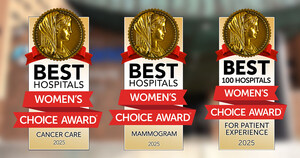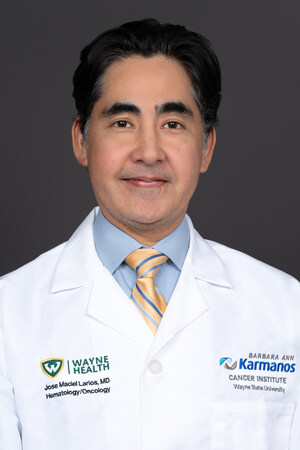Joint call to action urges individuals, providers and insurers to increase access to and utilization of low-dose CT screening for those at high risk for lung cancer
DETROIT, Nov. 1, 2022 /PRNewswire/ -- The Barbara Ann Karmanos Cancer Institute has partnered with more than 50 cancer organizations across the country to issue a call to action urging individuals, providers and insurers to increase access to and utilization of low-dose computed tomography (CT) scans for those at high risk for lung cancer.
Lung cancer is the leading cause of cancer death in the United States, accounting for almost 25% of all cancer deaths. Despite advances in treatment and successful efforts to reduce smoking, the disease kills more than 350 people in the U.S. each day — but it doesn't have to be this way. If all people who should be screened for lung cancer got screened, we can save tens of thousands of lives, and tens of millions of dollars. Lung cancer is so deadly because it is most often diagnosed at an advanced stage when treatment options are limited and outcomes are poor.
The U.S. Preventive Services Task Force recommends annual screening for people ages 50-80 who have smoked for at least 20 years. However, only 5.7% of eligible Americans were screened for lung cancer before the COVID-19 pandemic — compared to screening rates for breast, cervical and colon cancers that hover between 60% and 80%. And we know screening rates have decreased for all cancers due to the pandemic.
"Lung cancer remains the leading cause of cancer related mortality in the United States," said Hirva Mamdani, M.D., medical oncologist, leader of the Thoracic Oncology Multidisciplinary Team and director of the Lung Cancer Screening Program at Karmanos Cancer Institute. "We can make a huge difference in the number of deaths by detecting the cancer early, at a curable stage, with an annual low dose CT scan of the chest. Lung cancer screening can save thousands of lives and is crucial to our success in defeating this deadly disease."
"Early detection is key to reducing lung cancer deaths. We estimate as many as 60,000 lives could be saved each year if the 14.5 million Americans who are eligible received annual lung cancer screening. This would allow us to catch the disease early when curative treatment options are available," said Jhanelle E. Gray, M.D., statement co-author and department chair and program leader of Thoracic Oncology at Moffitt Cancer Center in Tampa, Florida.
The new effort also aligns with and supports the national Cancer Moonshot initiative, which aims to reduce cancer deaths by 50% over the next 25 years. Lung cancer screening is one easy way to help reach that goal. This call to action provides guidance for national support, including public funding and health policy changes needed to significantly improve lung cancer screening participation.
Two major barriers to screening are coverage and access. While low-dose CT screening for lung cancer is covered by Medicare and most private insurance plans, the pre-authorization process can delay the procedure by several days and place an unnecessary burden on community providers. Additionally, a recent study by the American Cancer Society found that at least 5% of those eligible for low-dose CT scans live more than 40 miles from a screening facility — and that percentage jumps to nearly 25% for screening-eligible individuals in rural areas.
"We have identified the barriers to lung cancer screening. Now, we need everyone to come together to overcome them. We need a national education and awareness campaign — not just to reach individuals who are eligible for screenings, but also the providers and health educators who should be recommending them," said Mary Reid, Ph.D., MSPH, statement co-author and chief of Cancer Screening and Survivorship at Roswell Park Comprehensive Cancer Center in Buffalo, New York.
Together, we have an unprecedented opportunity to drive down cancer deaths by taking advantage of a tool that is effective, noninvasive and inexpensive. We urge people to talk to their physicians about lung cancer screening or to take advantage of resources, such as the American Lung Association's screening eligibility quiz or GO2 Foundation for Lung Cancer state-by-state screening center directory.
If a patient is eligible for lung cancer screenings, they should inquire with their primary care physician about Karmanos' Lung Cancer Screening Program. For more information, visit karmanos.org/lungscreening or call 1-800-KARMANOS.
Karmanos Cancer Institute is a leader in transformative cancer care, research and education through courage, commitment and compassion. The Karmanos vision is a world free of cancer. As part of McLaren Health Care, Karmanos is the largest provider of cancer care and research in Michigan. For more than 75 years, the administrative and research headquarters, along with the premier specialty cancer hospital, have been located in downtown Detroit. With 16 network sites, Karmanos delivers world-renowned care and access to clinical trials throughout Michigan and northern Ohio. The National Cancer Institute recognizes Karmanos as one of the best cancer centers in the nation with a comprehensive cancer center designation. Its academic partnership with the Wayne State University School of Medicine provides the framework for cancer research and education – defining new standards of care and improving survivorship. For more information, call 1-800-KARMANOS (800-527-6266) or visit www.karmanos.org. Follow Karmanos on Facebook, Twitter, LinkedIn and YouTube.
SOURCE Karmanos Cancer Institute

WANT YOUR COMPANY'S NEWS FEATURED ON PRNEWSWIRE.COM?
Newsrooms &
Influencers
Digital Media
Outlets
Journalists
Opted In





Share this article